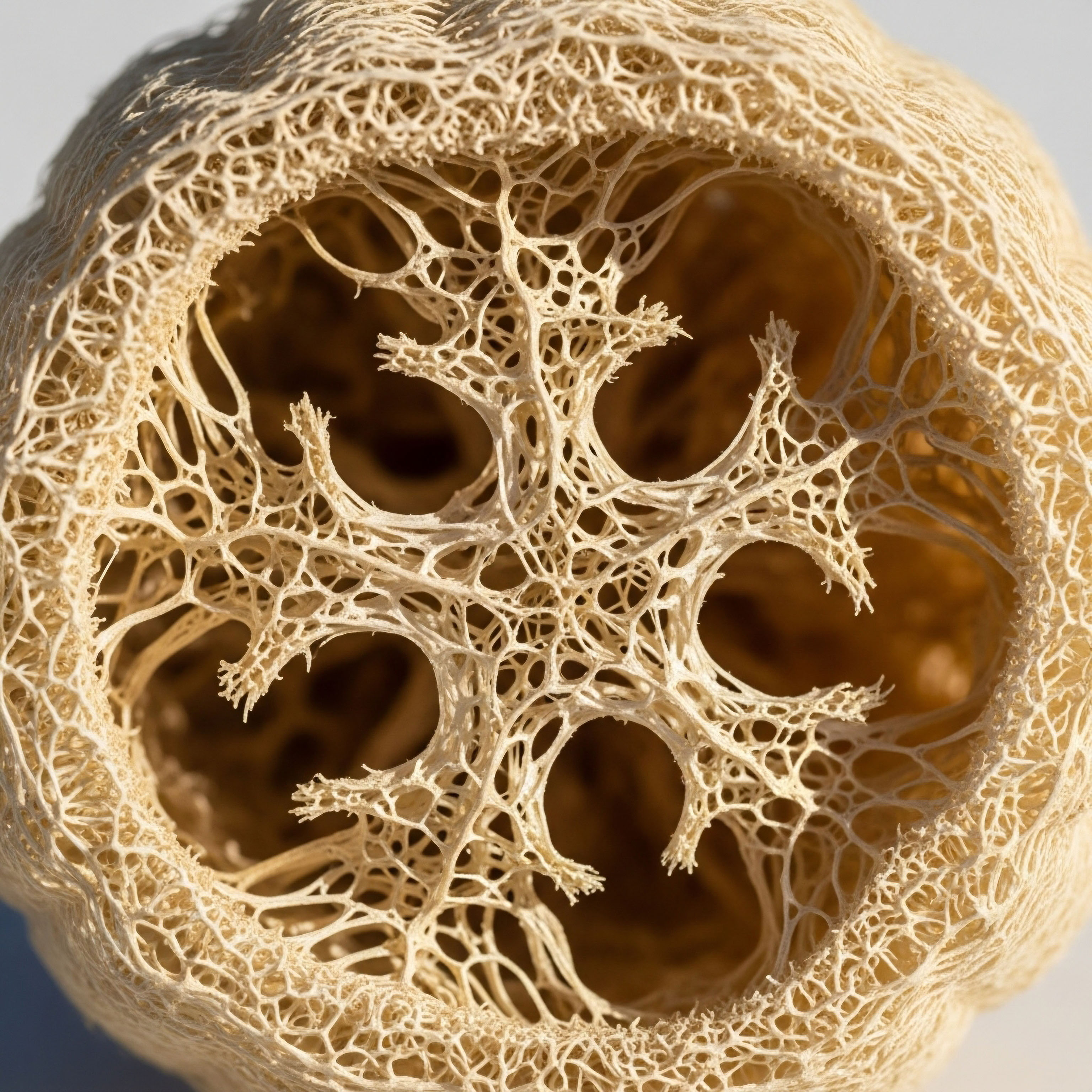

Reclaiming Cognitive Vitality through Hormonal Equilibrium
Many individuals experience subtle shifts in their mental acuity over time, a creeping sensation of diminished focus, occasional memory lapses, or a general reduction in mental stamina. This experience can feel disorienting, prompting a search for clarity and understanding. These changes often signal an underlying biological narrative, one deeply intertwined with the intricate dance of the body’s endocrine system.
The conversation surrounding testosterone frequently centers on its reproductive roles, yet its influence extends profoundly into the very architecture and function of the brain, shaping cognitive health and overall vitality. Understanding this broader scope provides a pathway to not only comprehending these shifts but also actively participating in their recalibration.
Optimal testosterone levels serve as a foundational element for sustained neurological health, supporting the brain’s capacity for clear thought, robust memory, and consistent emotional regulation. This hormonal presence facilitates a more resilient cognitive landscape. Lifestyle choices emerge as potent modulators of endogenous testosterone production, offering individuals a direct means to influence their internal biochemistry. Integrating specific practices into daily routines provides a powerful, proactive strategy for enhancing brain function and fostering a profound sense of well-being.

Understanding Your Hormonal Blueprint
The endocrine system functions as a complex network of glands, secreting hormones that act as messengers throughout the body. Testosterone, a key steroid hormone, plays a role in numerous physiological processes extending far beyond its well-recognized reproductive functions. Its presence impacts bone density, muscle mass, mood stability, and particularly, the intricate workings of the central nervous system.
A decline in circulating testosterone, often associated with aging or specific health conditions, correlates with a range of symptoms, including reduced mental sharpness and a pervasive sense of cognitive fatigue.
Healthy testosterone levels are a cornerstone of cognitive vitality, supporting mental clarity, memory, and emotional balance.
The brain possesses a remarkable sensitivity to hormonal fluctuations. Testosterone directly influences neural pathways and cellular health within various brain regions crucial for cognitive processes. Maintaining physiological balance within this hormonal milieu supports the brain’s inherent capacity for learning, memory consolidation, and adaptive reasoning. Recognizing these connections empowers individuals to view their symptoms as signals from an interconnected biological system, prompting a more informed and proactive approach to health.

The Endocrine System’s Cognitive Symphony
Consider the brain as a sophisticated orchestra, with hormones acting as its vital conductors, ensuring each section performs in synchrony to produce a harmonious cognitive output. Testosterone contributes to this symphony by modulating neurotransmitter activity, supporting synaptic plasticity, and promoting neurogenesis in key areas like the hippocampus.
This multifaceted action underpins the long-term maintenance of cognitive functions, including attention, processing speed, and executive decision-making. Sustaining healthy testosterone levels, whether through endogenous support or clinical protocols, becomes a strategy for preserving the brain’s structural integrity and functional prowess.
The interaction between testosterone and brain cells extends to influencing cellular energy production and protecting against oxidative stress. These protective mechanisms safeguard neurons from damage, thereby contributing to sustained cognitive resilience over time. Individuals seeking to optimize their mental performance find a compelling link between their hormonal status and their brain’s enduring capacity for high-level function.


Optimizing Hormonal Balance for Enduring Mental Acuity
For individuals seeking to address cognitive concerns linked to hormonal changes, a clinically informed approach becomes paramount. The goal involves not merely alleviating symptoms but recalibrating the underlying biochemical systems to restore optimal function. This journey often involves a combination of targeted clinical protocols and strategic lifestyle modifications, working synergistically to support the body’s inherent intelligence. Understanding the specific mechanisms of these interventions illuminates the path toward sustained cognitive benefits.

Hormonal Optimization as a Clinical Imperative
Testosterone Replacement Therapy (TRT) protocols are carefully tailored to individual physiological needs, aiming to restore circulating testosterone to a healthy, physiological range. For men experiencing symptoms of hypogonadism, standard protocols often involve weekly intramuscular injections of Testosterone Cypionate. This therapy is frequently complemented by Gonadorelin, administered subcutaneously twice weekly, to help preserve natural testicular function and fertility.
Anastrozole, an oral tablet taken twice weekly, serves to manage estrogen conversion, preventing potential side effects. Enclomiphene may also be incorporated to support luteinizing hormone (LH) and follicle-stimulating hormone (FSH) levels, further refining the endocrine system’s delicate balance.
Women also benefit from precise hormonal support, particularly during pre-menopausal, peri-menopausal, and post-menopausal phases when symptoms like irregular cycles, mood shifts, and reduced libido may present. Protocols for women typically involve low-dose Testosterone Cypionate, often 10 ∞ 20 units weekly via subcutaneous injection, to optimize levels without masculinizing effects.
Progesterone administration is guided by menopausal status, supporting overall hormonal harmony. Pellet therapy offers a long-acting testosterone delivery method, with Anastrozole considered when clinically appropriate. These applications highlight the precision required in restoring endocrine equilibrium for both genders, extending benefits to cognitive domains.
Precise hormonal optimization protocols aim to restore physiological balance, supporting cognitive function and overall well-being.

Lifestyle Protocols for Endogenous Support
Beyond direct hormonal support, daily lifestyle choices function as powerful levers for endogenous testosterone production and overall metabolic health, directly impacting cognitive function. A well-structured lifestyle protocol systematically addresses the core physiological demands of the body, creating an environment conducive to hormonal synthesis and neural resilience.
Consider the following fundamental elements ∞
- Targeted Nutrition ∞ A dietary pattern rich in whole, unprocessed foods, healthy fats, and adequate protein provides the necessary building blocks for hormone synthesis and neurotransmitter function. Minimizing refined sugars and inflammatory foods helps regulate insulin sensitivity, a critical factor influencing testosterone levels and brain health.
- Strategic Movement ∞ Regular physical activity, particularly resistance training and high-intensity interval training (HIIT), stimulates testosterone production and enhances cerebral blood flow. Exercise also promotes the release of neurotrophic factors, such as Brain-Derived Neurotrophic Factor (BDNF), which are vital for neuronal growth and synaptic plasticity.
- Restorative Sleep ∞ Deep, uninterrupted sleep is a non-negotiable component of hormonal regulation. The majority of testosterone synthesis occurs during sleep, making consistent, high-quality rest essential for maintaining optimal levels and supporting cognitive restoration.
- Stress Modulation ∞ Chronic stress elevates cortisol, a hormone that can antagonize testosterone production and impair hippocampal function, leading to cognitive deficits. Practices like mindfulness, meditation, and structured relaxation techniques mitigate stress responses, fostering a more favorable hormonal environment for brain health.

How Does Sustained Testosterone Optimization Influence Brain Function?
Sustained testosterone optimization influences brain function through several interconnected pathways. Testosterone interacts with androgen receptors distributed throughout the brain, particularly in regions critical for memory, spatial cognition, and emotional processing, such as the hippocampus, amygdala, and cerebral cortex. This interaction initiates genomic and non-genomic signaling cascades that promote neuronal survival, enhance synaptic strength, and support the intricate neural networks underlying complex thought.
The hormone’s capacity to reduce neuroinflammation and oxidative stress further contributes to a protective brain environment. Chronic low-grade inflammation and oxidative damage can impair neuronal function and accelerate cognitive decline. By mitigating these deleterious processes, optimized testosterone levels contribute to the long-term preservation of cognitive integrity.
| Lifestyle Pillar | Primary Impact on Testosterone | Direct Cognitive Benefit |
|---|---|---|
| Nutrition | Provides precursors for synthesis, regulates insulin sensitivity | Supports neurotransmitter production, stabilizes blood glucose for sustained energy |
| Exercise | Stimulates acute and chronic production, reduces adipose tissue (aromatase source) | Increases neurotrophic factors (BDNF), enhances cerebral blood flow, improves executive function |
| Sleep | Facilitates peak nocturnal synthesis and release | Consolidates memories, restores neural energy, supports synaptic pruning |
| Stress Management | Reduces cortisol’s antagonistic effects on testosterone | Preserves hippocampal function, reduces anxiety, improves focus |


Neuroendocrine Plasticity and Cellular Resilience for Cognitive Longevity
The profound and enduring cognitive benefits of sustained testosterone optimization extend into the intricate realms of neuroendocrine plasticity and cellular resilience. This perspective moves beyond surface-level observations, delving into the molecular and cellular mechanisms that underpin the brain’s capacity for adaptation, repair, and sustained high-level function. A deep understanding of these pathways reveals how hormonal equilibrium orchestrates a symphony of protective and regenerative processes within the central nervous system.

Androgen Receptors Orchestrating Neural Function
Testosterone exerts its influence on cognitive function primarily through its interaction with androgen receptors (ARs), which are widely distributed throughout the brain. High concentrations of ARs are observed in crucial cognitive centers, including the hippocampus, prefrontal cortex, and amygdala. The binding of testosterone to these receptors initiates a cascade of genomic and non-genomic signaling events.
Genomic actions involve the translocation of the activated AR complex into the nucleus, where it modulates the transcription of specific genes. These genes are implicated in neuronal survival, dendritic branching, and synaptic plasticity, all fundamental processes for learning and memory.
Non-genomic actions, occurring more rapidly, involve testosterone’s interaction with membrane-bound ARs or other signaling molecules, triggering intracellular pathways such as the mitogen-activated protein kinase (MAPK) and phosphoinositide 3-kinase (PI3K)/Akt pathways. These pathways are critical for cell survival, neuroprotection against excitotoxicity, and the regulation of neurotransmitter release. The precise localization and diverse signaling capabilities of ARs underscore testosterone’s role as a direct modulator of neural architecture and function, contributing to the long-term maintenance of cognitive integrity.

Neurosteroid Pathways and Synaptic Architecture
The brain possesses an inherent capacity for neurosteroidogenesis, synthesizing steroid hormones de novo from cholesterol or converting circulating precursors within neural tissue. Testosterone itself can serve as a precursor for other neuroactive steroids, including dihydrotestosterone (DHT) via 5α-reductase, and estradiol via aromatase, both of which possess significant neurobiological activity. This local synthesis and metabolism create a unique neurochemical milieu that profoundly influences synaptic architecture and neuronal excitability.
Neurosteroids such as pregnenolone sulfate and allopregnanolone, derived from various steroid precursors, modulate critical neurotransmitter systems. Pregnenolone sulfate, for instance, acts as a positive allosteric modulator of NMDA receptors and an antagonist at GABA-A receptors, influencing synaptic transmission and plasticity.
Allopregnanolone, a potent positive allosteric modulator of GABA-A receptors, impacts neuronal excitability and neurogenesis, particularly in the hippocampus. The sustained optimization of testosterone can influence the delicate balance of these neurosteroids, thereby supporting neurogenesis and synaptic remodeling, which are crucial for adaptive cognitive function and resilience against age-related decline. This intricate interplay between testosterone and local neurosteroid synthesis highlights a sophisticated mechanism for maintaining long-term brain health.

Cellular Resilience and Cognitive Longevity
Beyond direct receptor activation and neurosteroid modulation, optimized testosterone levels contribute to cellular resilience, a foundational element for cognitive longevity. This involves several protective mechanisms ∞
- Mitochondrial Bioenergetics ∞ Testosterone supports mitochondrial function, the primary site of cellular energy production. Efficient mitochondrial activity is essential for the high energy demands of neurons, preventing bioenergetic deficits that can impair cognitive processes.
- Antioxidant Defense Systems ∞ Testosterone enhances the activity of endogenous antioxidant enzymes, thereby mitigating oxidative stress, a significant contributor to neuronal damage and neurodegeneration. By reducing reactive oxygen species, testosterone helps preserve cellular integrity and function.
- Anti-inflammatory Pathways ∞ Chronic low-grade neuroinflammation accelerates cognitive decline. Testosterone exhibits anti-inflammatory properties, suppressing pro-inflammatory cytokines and modulating immune cell responses within the brain. This creates a less hostile microenvironment for neurons, promoting their survival and optimal function.
- Neurotrophic Factor Upregulation ∞ Optimized testosterone levels correlate with increased expression of neurotrophic factors, such as Brain-Derived Neurotrophic Factor (BDNF). BDNF is vital for neuronal growth, differentiation, and the maintenance of synaptic connections, playing a central role in learning and memory.
These integrated cellular mechanisms collectively contribute to a robust and resilient brain, capable of sustaining cognitive performance throughout the lifespan. The commitment to sustained testosterone optimization, through both lifestyle and clinical interventions, therefore represents a strategic investment in long-term neurological health and functional independence.
Testosterone supports cellular resilience through mitochondrial health, antioxidant defenses, anti-inflammatory actions, and neurotrophic factor expression.
| Mechanism Type | Specific Action | Cognitive Outcome |
|---|---|---|
| Direct Receptor Activation | Androgen receptor binding (genomic/non-genomic) | Enhanced neuronal survival, synaptic plasticity, gene expression for neural health |
| Neurosteroid Modulation | Influence on local synthesis (e.g. pregnenolone sulfate, allopregnanolone) | Regulation of neurotransmitter systems (GABAergic, NMDA), neurogenesis, synaptic remodeling |
| Cellular Protection | Reduced oxidative stress, anti-inflammatory effects | Preservation of neuronal integrity, mitigation of neurodegeneration |
| Neurotrophic Support | Upregulation of BDNF and other growth factors | Promotion of neuronal growth, differentiation, and synaptic maintenance |

References
- Beauchet, O. “Testosterone and cognitive function ∞ current clinical evidence of a relationship.” European Journal of Endocrinology, vol. 155, no. 6, 2006, pp. 787-798.
- Cherrier, M. M. et al. “Testosterone supplementation improves spatial memory in men with mild cognitive impairment and low testosterone.” Journal of Clinical Endocrinology & Metabolism, vol. 88, no. 6, 2003, pp. 2482-2488.
- Garcia, J. M. et al. “Cognitive response to testosterone replacement added to intensive lifestyle intervention in older men with obesity and hypogonadism ∞ prespecified secondary analyses of a randomized clinical trial.” American Journal of Clinical Nutrition, vol. 114, no. 5, 2021, pp. 1599-1608.
- Moffat, S. D. et al. “Longitudinal assessment of serum free testosterone concentration and cognitive performance in elderly men ∞ the Baltimore Longitudinal Study of Aging.” Archives of Neurology, vol. 59, no. 11, 2002, pp. 1769-1775.
- Muller, M. et al. “Endogenous testosterone and cognitive function in older men ∞ a study in the Longitudinal Aging Study Amsterdam.” Journal of Clinical Endocrinology & Metabolism, vol. 90, no. 9, 2005, pp. 5018-5023.
- Pike, C. J. “Testosterone-mediated neuroprotection through the androgen receptor in human primary neurons.” Journal of Neurochemistry, vol. 114, no. 1, 2010, pp. 245-255.
- Rastrelli, G. et al. “Testosterone supplementation and cognitive functioning in men ∞ A systematic review and meta-analysis.” Journal of Clinical Endocrinology & Metabolism, vol. 104, no. 7, 2019, pp. 2855-2868.
- Schumacher, M. et al. “Neurosteroids ∞ endogenous role in the human brain and therapeutic potentials.” Progress in Neurobiology, vol. 71, no. 4, 2003, pp. 317-332.
- Wang, Y. et al. “Protective mechanism of testosterone on cognitive impairment in a rat model of Alzheimer’s disease.” Molecular Neurobiology, vol. 54, no. 9, 2017, pp. 7149-7159.
- Zuloaga, D. G. et al. “Androgen Receptors in the Brain ∞ A behavioral perspective.” Hormones and Behavior, vol. 68, 2015, pp. 25-36.

A Personal Path toward Sustained Well-Being
The exploration of testosterone’s profound impact on cognitive function reveals a deeper understanding of your biological systems. This knowledge serves as a foundational step, empowering you to approach your health journey with greater clarity and purpose.
Recognizing the intricate connections between hormonal balance, metabolic function, and neurological vitality allows for a more personalized and effective strategy for reclaiming mental sharpness and overall well-being. Your unique biological narrative warrants a tailored approach, one that honors your lived experience while leveraging the precision of evidence-based science. Consider this understanding an invitation to engage actively with your physiology, shaping a future of sustained vitality and uncompromising function.



